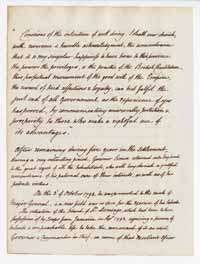N.D. — Memoir of John Graves Simcoe. [Similar to the published memoir at back of Simcoe's Journal, printed in New York by Bartlett & Welford in 1844.]
CWF Rockefeller Library, Special Collections - SCMS1930.6
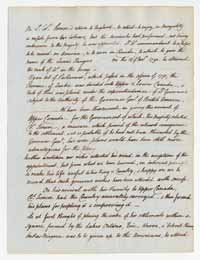
On Lt
Col Simcoe's return to England, he retired to enjoy in tranquility
a respite from his labours; but the services he had performed not being
unknown to his Majesty, he was appointed Lt
Col
Commandant to a Corps
to be raised in America, & to serve in Canada, to which he gave the
name of the Queen's Rangers. On the 18th
of Novr
. 1790, he obtained
the rank of Col in the Army.
By an Act of Parliament, which passed in the session of 1791, the
Province of Quebec was divided into Upper & Lower Canada, &
each of these was placed under the superintendence of Lt
Governor's
subject to the Authority of the Governor Genl
of British America.
-------- We have been this minute in giving this amount of
Upper Canada, for the Government of which His Majesty selected
Col Simcoe; a measure which proved of the utmost consequence
to the settlement, & it is probable if he had not been thwarted by the
Governor Genl
, his wise plans would have been still more
advantageous for the colony.
Neither ambition nor riches actuated his mind in the acceptance of the
appointment, but from what we have learned, an inherent principle
to make his life useful to his King & Country, & happy are we to
record that such generous wishes have been attended with success.
On his arrival with his family to Upper Canada,
Col Simcoe had the Country accurately surveyed, & then formed
his plans for peopling it & improving it.
He at first thought of placing the centre of his settlements within a
square formed by the Lakes Ontario, Erie, Huron, & Detroit River;
but as Niagara was to given up to the Americans, he altered
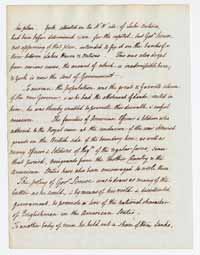 his plan. York, situated on the N. W. side of Lake Onatrio,
his plan. York, situated on the N. W. side of Lake Onatrio,
had been before determined [up]on for the capitol, but Govr
Simcoe
not approving of that plan, intended to fix it on the banks of a
River between Lakes Huron & Ontario. This was also dropt
from various causes, the account of which is inadmissible here;
& York is now the seat of Government.
To increase the population was the great & favorite scheme
of the new Governor, & as he had the allotment of Lands vested in
him, he was thereby enabled to promote this desirable & useful
measure. The families of American officers & soldiers who
adhered to the Royal cause at the conclusion of the war obtained
grants on the British side of the boundary line, as well as
many officers & soldiers of Regts
of the regular forces; since
that period, emigrants from the Mother Country & the
American States have also been encouraged to settle there.
The policy of Govr Simcoe was to draw as many of the
latter as he could, & by means of his mild & disinterested
government, to promote a love of the national character
of Englishmen in the American States.
To another body of men he held out a share of these Lands,
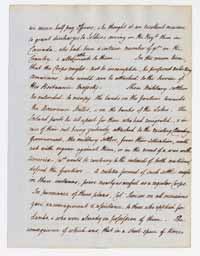 we mean half pay Officers; & he thought it an excellent measure
we mean half pay Officers; & he thought it an excellent measure
to grant discharges to soldiers serving in the Regts
then in
Canada, who had been a certain number of yrs
in the
Country; & allot settlements to them. In the mean time,
that the Corps might not be incomplete, he proposed enlisting
Americans, who would soon be attached to the service of
His Britannic Majesty. These military settlers
he intended to occupy the lands on the frontiers towards
the American States, & on the banks of the Lakes. The
Inland parts he set apart for those who had emigrated, & in
case of their not being zealously attached to the existing Country
Government, the military settlers, from their situation, could
act with vigour against them, or in the event of a war with
America (which would be contrary to the interests of both nations)
defend the frontiers. A militia formed of such settlers might
in these instances, prove nearly as useful as a regular Corps.
In pursuance of these plans, Col Simcoe on all occasions
gave encouragement & assistance to those who applied for
Lands, & who were already in possession of them. The
consequence of which was, that in a short space of time
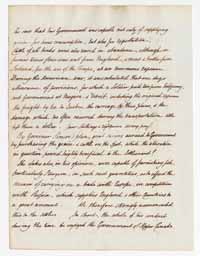 he saw that his Government was capable not only of supplying
he saw that his Government was capable not only of supplying
grain for home consumption, but also for exportation:
Cattle of all kinds were also reared in abundance, although
in former times flour was sent from England, & meat & butter from
Ireland, for the use of the Troops, at an enormous expence.
During the American war, it was calculated that one day's
allowance of provisions, for which a soldier paid two pence halfpenny
cost Government at Niagara & Detroit, including the original expence
the freight by sea to Quebec, the carriage to these places, & the
damage which too often occurred during the transportation little
less than a dollar. (four shillings & eightpence army pay).
By Governor Simcoe's plan, great saving accrued to Government
by purchasing the grain & cattle on the spot, while the alteration
in question proved highly beneficial to the settlement!
The Lakes also, in his opinion, were capable of furnishing fish,
particularly sturgeon, in such vast quantities, as to afford the
means of carrying on a trade with Europe, in competition
with Russia, which supplies England & other Countries to
a great amount. He therefore strongly recommended
to the settlers. In short, the whole of his conduct
during the time he enjoyed the Government of Upper Canada,
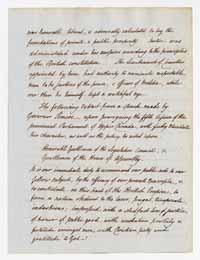 was honorable, liberal, & admirably calculated to lay the
was honorable, liberal, & admirably calculated to lay the
foundations of private & public prosperity. Justice was
administered under his auspices according to the principles
of the British constitution. The Lieutenants of Counties
appointed by him had authority to nominate respectable
men to be justices of the peace, & officers of militia, while
over these he himself kept a watchful eye.
The following extract from a speech made by
Governor Simcoe, upon proroguing the fifth session of the
provincial Parliament of Upper Canada, will fully elucidate
his character, as well as the policy he acted upon.
Honorable Gentlemen of the Legislative Council, &
Gentlemen of the House of Assembly.It is our immediate duty to recommend our public acts to our
fellow subjects, by the efficiency of our private example, &
to contribute, in this tract of the British Empire, to
form a nation obedient to the laws, frugal, temperate,
industrious; impressed with a steadfast love of justice,
of honor of public good, with undertaken probity &
fortitude amongst men, with Christian piety &
gratitude to God!"Conscious of the intention of well doing, I shall ever cherish
with reverence & humble acknowledgment, the remembrance
that it is my singular happiness to have borne to this province
the powers the privileges, & the practice of the British constitution
this perpetual monument of the good will of the Empire,
the reward of tried affections & loyalty, can best fulfil the
just end of all government, as the experience of ages
has proved, by communicating universally protection &
prosperity to those who make a rightful use of
its advantages."
After remaining during five years in the settlement,
during a very interesting period, Governor Simcoe returned into England,
to the great regret of all the Inhabitants, who will long cherish a grateful
remembrance of his paternal care of their interests, as well as of his
private virtues.
On the 3d
of October 1794, he was promoted to the rank of
Major General, & a new field was to open for the exercise of his talents.
The situation of the Island of St. Domingo, which had been taken
possession of by troops from Jamaica in Sept 1793, requiring a person of
talents & irreproachable life to take the command of it as civil
Governor & Commander in Chief, in [illegible]oom of that excellent officer
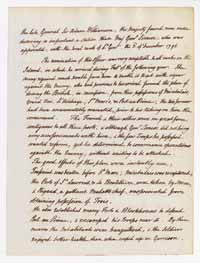 the late General Sir Adam Williamson, His Majesty found none more
the late General Sir Adam Williamson, His Majesty found none more
deserving so important a station than Maj Genl
Simcoe, who was
appointed, with the local rank of Lt
Genl, the 3d
of December 1796.
The nomination of this officer was very acceptable to all ranks in the
Island, in which he arrived during Febr
of the following year. The
Army required much trouble from him to enable it to act with vigour
against the enemy, who had previous to his arrival formed the plan of
driving the British, in succession, from their possessions of Mirebalais,
Grand Bois, L'Archahaye, St Marc's, & Port au-Prince; the two former
had been unaccountably evacuated, prior to his taking on him the
command. The French and their allies were in great force
contiguous to all these posts; & although Genl
Simcoe did not bring
any reinforcements with him, & the few Troops he possessed
wanted reform, yet he determined to commence operations
against the Enemy, without waiting to be attacked.
The good effects of this plan were instantly seen;
[Tompaint] was beaten before St Marc; Mirebalais was recaptured;
the Ports of St
Lawrent, & le Boutelliere, were taken by storm,
& Rigaud, a gallant Mulatto chief, was prevented from
obtaining possession of Trois.
He also established many Forts and Blockhouses to defend
Port au Prince, & encamped his Troops near it. By these
means the Inhabitants were tranquilized, & the soldiers
enjoyed better health than when cooped up in Garrison.
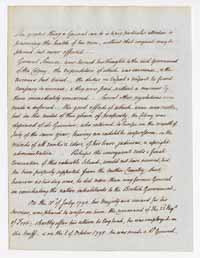 The greatest thing a General can do is to pay particular attention to
The greatest thing a General can do is to pay particular attention to
preserving the health of his men; without that conquests may be
planned, but never effected.
General Simcoe now turned his thoughts to the civil Government
of the Colony, the expenditure of which was immense, & the
revenues but trivial, the duties on Export2
& Import1
he found
necessary to increase, & they were paid without a murmur by
those immediately concerned. Several other regulations were
made & enforced, the good effects of which were soon visible,
but in the midst of this gleam of prosperity, the Colony was
deprived of its Governor, who returned to Europe in the month of
July of the same year, leaving an indelible impression on the
minds of all ranks & colors, of his brave, judicious, & upright
administration. Perhaps the consequent evils & final
evacuation of this valuable Island, would not have occurred, had
he been properly supported from the Mother Country; short,
however as his day was, he did more than any former General
con[illegible]ating the native inhabitants to the British Government.
On the 18th
of July 1790, His Majesty as a reward for his
services, was pleased to confer on him the command of the 22d
Regt
of Foot; shortly after his return to England, he was employed on
the staff, & on the 22d
of October 1790 he was made a Lt
General
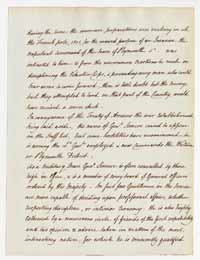 during the time the immense preparations were making in all
during the time the immense preparations were making in all
the French ports, [1801], for the avowed purpose of an Invasion, the
important command of the town of Plymouth &c was
intrusted to him, & from the uncommon exertions he made in
disciplining the Volunteer Corps, & persuading every man who could
bear arms to come forward, there is little doubt but the Enemy,
had they attempted to land in that part of the Country, would
have received a severe check.
In consequence of the Treaty of Amiens the war establishment
being laid aside, the name of Genl
Simcoe ceased to appear
on the staff list, but since hostilities have recommenced he
is among the Lt
Genls
employed & now commands the Western
or Plymouth District.
As a military man Genl
Simcoe is often consulted by those
high in office, & is a member of every board of General Officers
ordered by His Majesty. In fact few Gentlemen in the Service
are more capable of deciding upon professional affairs, whether
respecting discipline, or interior economy. He is also highly
esteemed by a numerous circle of friends of the first respectability
and his opinion & advice taken in matters of the most
interesting nature, for which he is eminently qualified
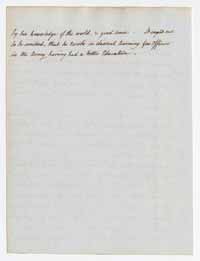 by his knowledge of the world, & good sense. It ought not
by his knowledge of the world, & good sense. It ought not
to be omitted, that he excels in classical learning, few officers
in the Army having had a better education.
